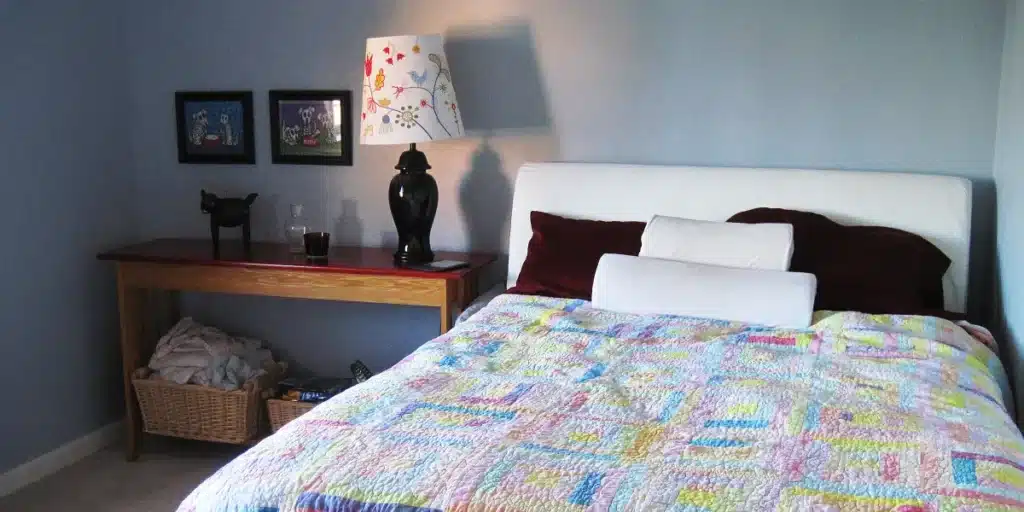I borrowed Daniel’s spare phone for a weeklong trip to Chicago, assuming the most dramatic thing that would happen was a missed connection or a cold hotel breakfast. Fifteen years of marriage, three kids, a house we’d made ours brick by careful brick—I believed we were steady. I’d pressed pause on my career so he could climb, turned myself into the anchor at home, and only recently tiptoed back to work with a part-time consulting job. When my boss insisted I travel, Daniel hugged me from behind and promised he had the kids handled. “You’ll never have to find out what life without me is like,” he said. I didn’t realize how fast that sentence would curdle.
On night three, the loaner phone buzzed with a message from an unfamiliar number. I almost ignored it. Then the photo loaded. A woman lounged on our bed. In my bathrobe. The crooked lamp on the nightstand—the one I kept straightening—sat tilted in the background. The caption read: “Can’t wait until you’re back in my arms.” My scalp prickled. Maybe a wrong number. Maybe a cruel coincidence. I typed, pretending to be him: “Send me more, baby. You know how I love it when you call me that name.” The reply landed with a second photo and five words: “Anything for you, my lion.” Our private name. No one else knew it.
I felt something cold settle inside me. There was a reflection in the mirror—just the hand holding the phone—and a small crescent moon tattoo winked from the right index finger. I knew that mark. I’d held that hand while the ink dried, a chaotic Vegas weekend at twenty-two. Madison. My best friend of twenty years. My confidante. My child’s godmother. The woman who helped me choose my wedding bouquet. The ache was bone-deep and blinding.
I flew home with a smile I’d stapled in place. The kids sprinted into my arms, chattering about sleepovers at friends’ houses—so many that they “hardly saw Daddy.” Daniel appeared in the doorway with his practiced warmth. Later, alone in the bathroom, I slid to the tile and let the grief tear through me. Then I stood up, washed my face, and made two calls.
“Dinner tomorrow?” I asked Madison, sugar in my voice. “Let’s celebrate how smoothly the week went.” She chirped yes. I told Daniel I’d cook his favorite. I laid out the wedding china, lit candles, opened the good wine. They arrived soft-voiced and hungry, serving me small talk as if they hadn’t salted the earth of my life.
“Oh! A little presentation from Chicago,” I said lightly, pairing my phone to the TV. The first photo appeared: Madison in my robe, on my bed. A fork clattered. A wineglass hovered. I clicked to the next image—her legs across my sheets—and then to the messages, “my lion” glowing in crisp text. Silence pooled in the room.
“Funny thing about technology,” I said, sawing my steak with surgical calm. “Sometimes messages wander to the wrong device.”
“Jennifer, I can explain,” Daniel started.
“Can you?” I didn’t raise my voice. “Explain why my best friend was wearing my clothes in my home while I was working for our family?”
“It just happened,” Madison whispered, mascara already cutting black rivers down her cheeks. “We never meant for you to—”
“To find out?” I laughed once, a sound with no air in it. “Two decades, Mads.”
Apologies tumbled out, shapeless and useless. Counseling was offered. Fresh starts were floated. I had already done my starting over. I’d visited an attorney, documented everything, protected what was protectable. “The kids and I will be fine,” I said, and both of them flinched at the steadiness in my voice.
“But I am feeling generous,” I added. “You have one chance at honesty. Go upstairs and tell our children what you’ve done. Look them in the eyes and say why their family is breaking.”
“You can’t make us,” Daniel snapped, anger licking up where panic had been.
“I’m not making you do anything. I am telling you the price of seeing them after the divorce.”
Twenty minutes later, we sat in the living room while our three kids learned a vocabulary they should never need. My twelve-year-old stared at her father like he was a stranger. “How could you do this to Mom?” My nine-year-old curled into me and sobbed. The youngest turned to Madison, voice small. “But you’re my godmother. You said you loved us.”
After they left, the house hummed with the quiet that follows demolition. I took that bathrobe to the fire pit and fed it to the flames. I watched the fabric collapse into ember and ash and felt the first clean breath I’d had in days.
Today I’m sitting in my kitchen—my kitchen, in the house I kept—watching cereal bowls and lunchboxes move down the counter like a tiny assembly line. The divorce is final. I’m back full-time, earning my own money, building a life that answers to me. Daniel moved in with Madison. Mutual friends say the shine dulled quickly; it turns out the thrill was in the sneaking, not the staying.
The kids are healing on their timetable. So am I. Some betrayals don’t just break you; they remove the weight that was pinning you to the floor. I once believed loyalty meant holding the world together alone. Now I know real loyalty starts with myself—and that showing them what betrayal costs was never about revenge. It was about setting the price of my dignity and refusing to bargain.
